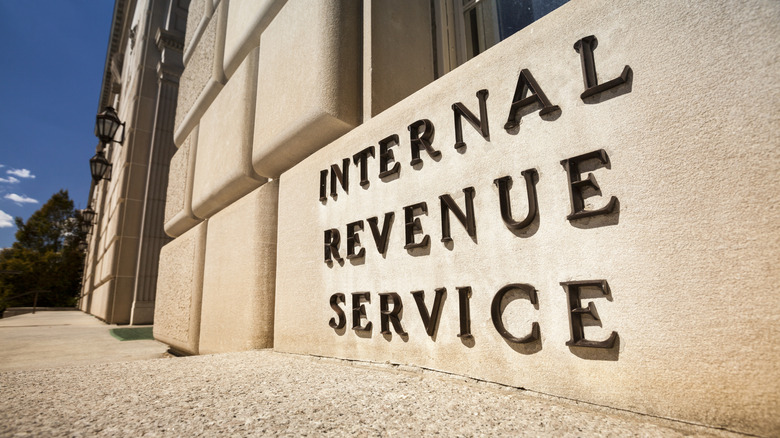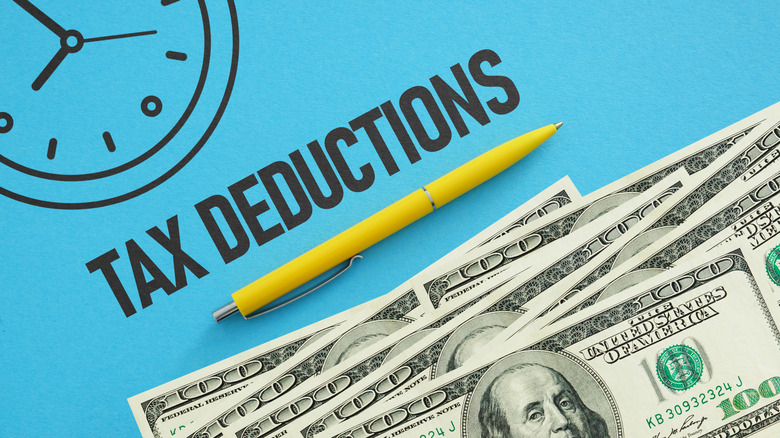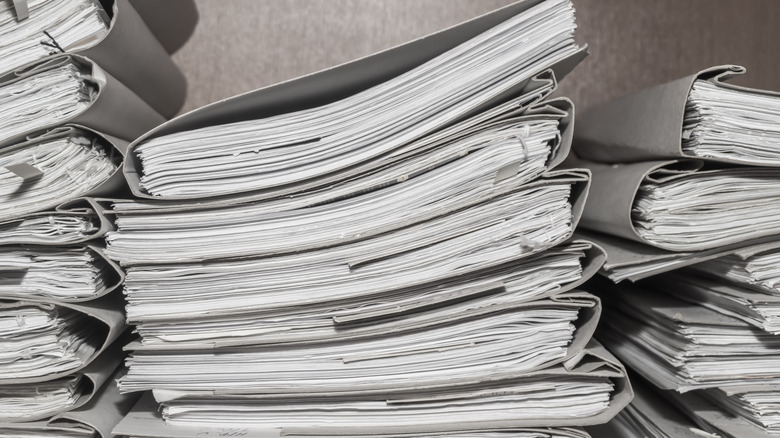Do This To Reduce Your Chances Of Getting Audited By The IRS
The IRS engages in a monumental task every spring, with every working American reporting their previous years' income by mid-April. Generally speaking, most taxpayers don't have much to worry about when it comes to filing, and ultimately receiving, any refunds that they are owed. Average refunds for the 2023 tax year were roughly $3,200. While many Americans are likely already contemplating what to do with their refund check this year, smart savers might want to leverage their tax refund for the greatest possible financial benefit by using it to pay down debts or increase retirement savings.
However, it's important to realize that chasing after a large tax refund can open you up to a different kind of problem. Taxpayers hoping to quickly make their way through the reporting tasks can sometimes run afoul of the IRS and its guidelines. There are plenty of ways to reduce your tax burden without cheating, so it's best to avoid the stress of getting a letter back from the IRS claiming you've done your taxes wrong. Whether the IRS requests clarification, alteration, or something more nuanced, these asks can delay your refund or even wipe it out altogether. While less than 1% of taxpayers get audited each year, the risk is still there. Worst of all, many of these audits can grow from simple mistakes. With that in mind, there are a few easy ways to help you mitigate the chances of being selected for additional scrutiny — and get your refund in hand much faster.
Don't lie on your annual tax filing
The most important thing you can do to prevent an IRS audit involves honesty. Lying on your taxes might not yield an audit this year, but intentionally submitting an inaccurate tax filing opens you up to the potential for an audit window that never ends. Unlike the window of time in which an audit can be conducted under normal circumstances (typically three years), falsifying information eliminates what is essentially the equivalent of a statute of limitations.
The reality is that the IRS has access to the same information you get from your employer and other sources of income such as your investment account activity and savings account interest accrual. If you choose to embellish your earnings (perhaps in an effort to increase your ability to borrow money – a criminal act) or underreport income in an effort to seek a reduction in your tax obligation, there's a good chance you'll be found out at some point in the future. Even though the IRS is keeping tabs –- at least tacitly –- on hundreds of millions of Americans at any one time, the truth will almost certainly catch up to you eventually. Lying on your taxes is akin to lying to the police while knowing they already know the answers. It's entirely possible to make a mistake when adding up figures in a particularly complicated tax situation, but intentionally misleading the IRS delivers a high probability that you will be caught.
Double check your records and deductions
Making a mistake on your taxes can happen. It's also possible to file your taxes before you have all the relevant information available, meaning you can do your calculation 'correctly' but still transmit an incorrect filing. If this happens, you'll need to file a 1040X amended return to correct the original filing. However, the best medicine for a mistake is catching it early. Rather than having to rely on an amended return that will delay receiving your refund, it's better to double check that you have all your information correct before submitting your taxes in the first place. Tax filers have quite a bit of leeway when it comes to timing. So, if you're unsure about the documentation you do have on hand, it's best to file for an extension instead of risking scrutiny over an incorrect submission. This will give you until October to finish your taxes, more than enough time to carve out a weekend to make the necessary calculations.
Another potential sticking point lies in your deduction figures. Making sure you aren't double dipping on features of an itemized deduction accidentally, or embellishing the value of claims, is critically important. In the same way that an incorrectly calculated income figure can open you up to audit, a suspicious set of deductions is equally problematic. The best way to keep yourself clear of IRS scrutiny is to only utilize deduction elements you can prove beyond a shadow of a doubt.
Keep your records organized and respond on time if needed
With all of this in mind, it's clear that the best way to keep yourself audit free is to simply follow the rules. Taxpayers who aren't looking to game the system will also generally find the best results when it comes to both their long term happiness and short term tax refund figures by staying above board. With that said, beyond simply complying with relevant tax laws that might impact your personal tax situation (for instance, your state filing obligations, early withdrawals from 401(k) or IRA accounts, or crossover between Social Security checks and salary payments), you'll also want to do one more thing.
Any documents you have to support the numbers you came up with on your tax return should be saved for at least a few years. Placing them in a folder alongside your tax filing paperwork allows you to reference them if the need arises. With this in place, it's easy to accomplish one final element of a strong audit avoidance strategy. If the IRS does contact you with questions about your financial disclosures, make sure to answer the letter promptly. Letting a query from the IRS sit idly for too long (most outreach has a 30-day clock on it) can bring you additional problems. You may have to pay penalty rates and even interest on any money owed if you leave it for too long. Similarly, a simple question can easily go downhill if you leave it up to interpretation by not responding.



